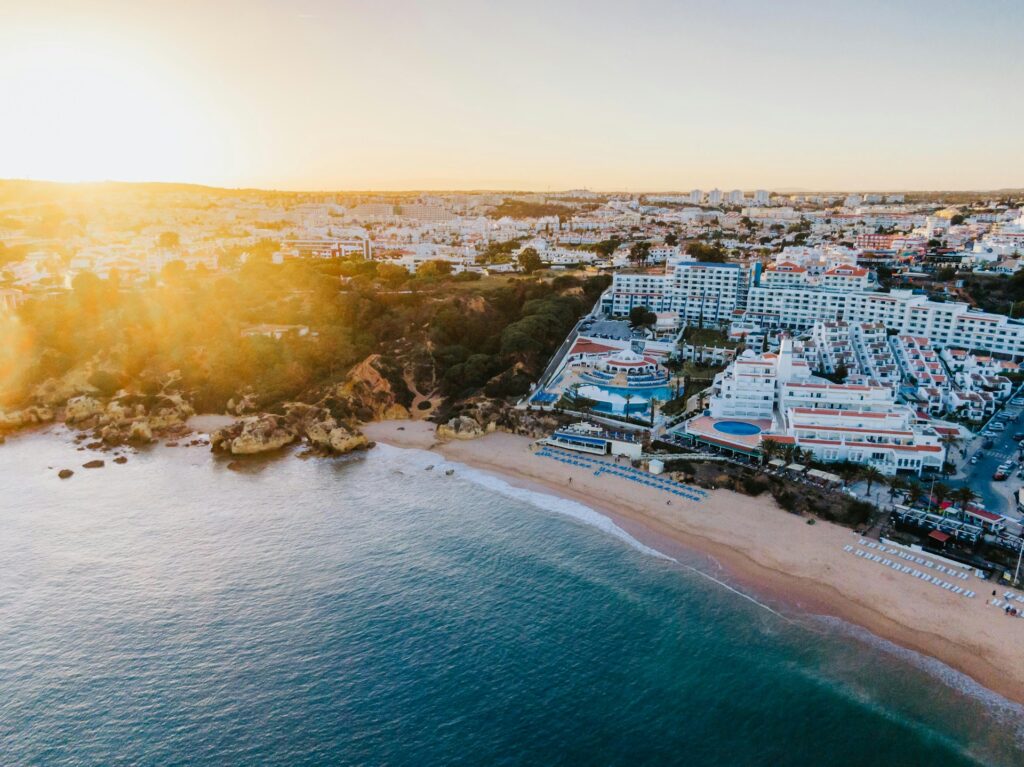Portugal’s mortgage market is set to experience notable changes in 2025, influenced by evolving interest rates, a dynamic housing market, and government initiatives aimed at improving housing affordability. As the European Central Bank (ECB) signals potential rate cuts and demand for property remains strong, both residents and international buyers may find new opportunities in the Portuguese real estate market.
In this article, we’ll explore key mortgage trends, current interest rates, and what homebuyers can expect when securing a mortgage in Portugal throughout 2025.
Overview of Mortgages in Portugal
In 2024, Portugal’s mortgage market experienced notable shifts, driven by evolving interest rates, a resilient housing sector, and government initiatives aimed at improving affordability.
Throughout the year, mortgage interest rates steadily declined, with the implicit interest rate on mortgage loans falling for ten consecutive months to 4.186% in November, down from 4.657% in January.
By March, the average interest rate stood at approximately 3.5% for variable-rate mortgages and 4% for fixed-rate mortgages. Interestingly, nearly 74% of new residential mortgages featured initial fixed rates lasting between one and five years, which then transitioned to variable rates.
The housing market in Portugal showed remarkable strength, with property prices rising by 11% year-on-year. This growth was accompanied by a surge in sales volumes, which increased by 27%. The total value of homes sold in the third quarter of 2024 reached a record €9.05 billion—a 28% increase compared to the same period in the previous year.
This surge in property transactions, while reflective of strong demand, also contributed to concerns about housing affordability, particularly in urban areas.
To address these challenges, the Portuguese government introduced a €2 billion housing package in September, aimed at constructing around 33,000 homes by 2030 to support low-income families.
This initiative is part of a broader strategy to expand the supply of affordable housing and improve living conditions across the country.

Portugal Mortgage Rates
Mortgages in Portugal can have variable, fixed, or mixed interest rates. Along with interest, borrowers must pay fees and other associated charges. For purchasing or constructing a primary residence, lenders provide the European Standardised Information Sheet (ESIS), which includes simulations of all three interest rate types. Once the borrower selects an interest rate, the lender presents a credit agreement proposal.
1. Variable Interest Rate Loan
For variable-rate home loans, the interest rate is the sum of the reference rate and the spread:
-
Reference rate: Typically based on Euribor (European Interbank Offered Rate), calculated from average quotes by European banks. Borrowers can choose from common terms like 3, 6, or 12 months.
-
Spread: An additional rate set by the lender, influenced by factors such as the borrower’s credit risk, loan-to-value ratio, and the lender’s financing costs. Some lenders offer reduced spreads when customers purchase optional financial products (bundling).
2. Fixed Interest Rate Loans
Fixed interest rate home loans maintain the same interest rate throughout the loan term, ensuring that monthly instalments remain consistent. The fixed rate is determined by the lender based on factors such as the borrower’s credit risk, loan-to-value ratio, financing costs, and the risk of locking in the rate for an extended period. While this option protects borrowers from interest rate fluctuations, the initial rate is typically higher compared to variable-rate loans with similar terms.
3. Mixed Interest Rate Loans
Mixed interest rate home loans combine a fixed-rate period with a variable-rate period. For example, a 30-year mortgage might have a fixed rate for the first five years, followed by a variable rate indexed to Euribor for the remaining 25 years. During the variable-rate period, lenders can only adjust the reference rate according to the chosen term. For instance, if the reference rate is the 3-month Euribor, the rate can only be updated every three months.

Mortgages in Portugal: Key Standardas
As a foreign investor, it’s important to understand the measures established by the Bank of Portugal to encourage responsible lending practices:
LTV (Loan-to-Value Ratio): The LTV ratio measures the loan amount compared to the lesser of the property’s purchase price or appraisal value. LTV is ≤ 90% for primary residences and ≤ 80% for other properties or non-primary residence loans. Non-residents can expect an LTV of 80%.
DSTI (Debt Service-to-Income Ratio): This compares monthly loan repayments to the borrower’s net income, with a standard limit of ≤ 50%, subject to certain lender exceptions.
Maturity Limits: The maximum maturity of these contracts may not exceed:
- 40 years for borrowers aged 30 or under;
- 37 years for borrowers aged over 30 and up to and including 35;
- 35 years for borrowers aged over 35.
Repaying and Transfer of Mortgages in Portugal
Home loans are typically repaid monthly through a bank debit account on an agreed date. Any changes to the payment date or account require mutual agreement with the bank. Banks cannot charge fees for processing monthly payments.
Early Repayment
Borrowers can repay their loan early, either partially or in full. For variable-rate loans, the early repayment fee is capped at 0.5% of the repaid amount, while for fixed-rate loans, it’s capped at 2%. Until December 31, 2025, variable-rate home loans for primary residences are exempt from this fee. No fee is charged if repayment is due to death, unemployment, or professional relocation of a borrower. Besides the repayment fee, banks can only charge expenses paid to government offices on the customer’s behalf.
Borrowers may also use savings plans, such as retirement or education savings accounts, to repay home loan instalments. Withdrawals made after at least five years are penalty-free.
Loan Transfers
To transfer a loan from one bank to another, borrowers must repay the loan in full. The original bank can charge an early repayment fee (maximum 0.5% for variable-rate loans and 2% for fixed-rate loans, with exemptions for variable-rate loans until the end of 2025), as well as expenses paid to government offices and interest up to the repayment date. After receiving a transfer request, the original bank must provide the new lender with information such as the outstanding principal and the elapsed loan term. Insurance agreements linked to the loan remain valid if their conditions remain unchanged.

What to Expect for Portugal Mortgages in 2025
Interest Rates
As of January 2025, Portugal’s long-term interest rate stands at 2.96%. European Central Bank (ECB) policymaker Mario Centeno has indicated that the ECB aims to reduce key interest rates to around 2% as inflation stabilizes. This potential decrease could lead to more favorable mortgage rates for borrowers.
Mortgage Rates
Current mortgage rates in Portugal vary based on loan type and lender. For instance, interest-only loans may offer rates around 2.35% fixed over 10 years, while repayment loans could have rates near 2% fixed over 20 years with a 70% loan-to-value ratio. Variable rates, though less common, are typically tied to the Euribor plus the bank’s margin.
Housing Market Trends
The Portuguese real estate market has experienced significant growth, with a 10.8% increase in median house prices in the third quarter of 2024 compared to the same period in 2023. This upward trend is expected to continue into 2025, driven by strong demand from both domestic and international buyers.
Government Initiatives
To address housing affordability, the Portuguese government has approved legislation allowing the construction of homes on rural land, aiming to increase the supply of affordable housing. This initiative could influence housing availability and, subsequently, mortgage demand.
Tax Benefits for Young Buyers
Young adults under the age of 35 benefit from IMT (Imposto Municipal sobre Transmissões Onerosas de Imóveis) and stamp duty exemptions. This measure by the Portuguese government is already showing positive results, reflected in the increase in new mortgage contracts by young people. This incentive aims to make homeownership more accessible for the younger generation, supporting their entry into the property market.

Is buying property in Portugal a good investment?
Buying property in Portugal can be a great investment, depending on your financial goals, location preferences, and investment horizon. Here are key factors to consider:
1. Stable Real Estate Market
Portugal’s real estate market has shown consistent growth over the past decade. In 2024, property prices increased by 11% year-on-year, reflecting strong demand from both local and international buyers. This trend is expected to continue in 2025, particularly in urban hubs like Lisbon, Porto, and the Algarve.
2. Attractive Rental Yields
Portugal offers solid rental yields, particularly in popular tourist areas and major cities. Short-term rentals through platforms like Airbnb can generate higher returns, especially in coastal regions and historic city centers. Long-term rentals also provide steady income, with demand driven by expats, digital nomads, and a growing local population.
3. Favorable Tax Benefits
Portugal provides several tax incentives for property investors. For example, the Non-Habitual Resident (NHR) regime offers tax benefits to foreign residents, although recent reforms have limited some advantages. Additionally, young buyers under 35 benefit from exemptions on property transfer tax (IMT) and stamp duty, which can increase property demand.
4. Affordable Financing Options
Mortgage interest rates in Portugal are becoming more attractive. In 2024, the implicit interest rate on mortgage loans dropped to 4.186% in November, with expectations of further declines in 2025 as the European Central Bank plans to lower key interest rates. This creates favorable borrowing conditions, especially for long-term investors.
5. Government Support for Housing
The Portuguese government is addressing housing shortages by increasing the construction of affordable homes. This initiative, combined with legislation allowing home construction on rural land, could expand the housing supply and create more investment opportunities.

How to Apply for a Mortgage as a Foreign Investor?
You have two primary options when applying for a mortgage in Portugal:
- Contact Multiple Banks Directly: Request financing proposals from different institutions to compare options.
- Work with a Mortgage Broker: A broker will manage the entire process, from research to negotiation, saving you time and effort.
Benefits of Using a Mortgage Broker in Portugal
1. Access to a Wider Range of Loan Options
One of the main advantages of working with a mortgage broker in Portugal is the access they provide to a diverse selection of lenders, including banks, credit unions, and private financial institutions. This broad network ensures borrowers can explore various loan programs, interest rates, and repayment terms, making it easier to find a mortgage that fits their needs. For instance, a broker can help you secure competitive Portugal mortgage rates for foreigners or guide you through specialized options like the Portugal Golden Visa mortgage.
2. Expertise in Assisting Foreign Clients
Navigating the Portuguese mortgage process can be challenging for expats due to differences in regulations and documentation requirements. Brokers who specialize in expat mortgages understand the unique obstacles international buyers face. Their expertise streamlines the process, ensuring a smoother and faster experience for those purchasing property from abroad.
3. Better Negotiation Power and Terms
Mortgage brokers often have strong relationships with multiple lenders, giving them leverage to negotiate more favorable terms on your behalf. This can lead to lower Portugal mortgage rates, reduced fees, and more flexible repayment plans, ultimately saving you money over the duration of your mortgage.
4. Time-Saving Convenience
Securing a mortgage in Portugal involves numerous steps, from researching and comparing rates to completing extensive paperwork. A mortgage broker handles these tasks, saving you time and effort. By quickly assessing different lenders and their terms, they present the best options, allowing you to focus on finding your ideal property without the hassle.
5. Cost-Effective Service with No Extra Fees
In most cases, mortgage brokers in Portugal are compensated by the lending institutions, meaning their services come at no additional cost to you. This makes using a broker a budget-friendly choice, as you gain access to their expertise, industry connections, and personalized guidance without any extra fees.
How We Can Assist You?
We can connect you with specialized mortgage brokers who understand the local market and can help you find the best loan options. Our expertise ensures a smoother application process, tailored to your needs, whether you’re a resident or an international buyer.
Looking to Invest in Portugal?
Explore our newest listings below!
